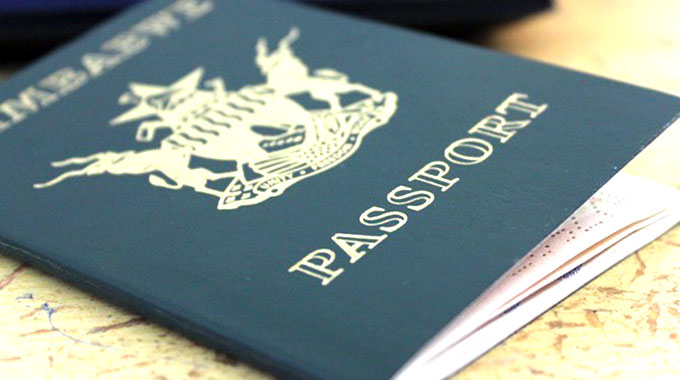UPDATED: Passport charges to go up

Fidelis MunyorO and Zvamaida Murwira
Passport fees will have to be increased significantly to enable the Registrar-General’s office to clear large backlogs.
This will result in the rapid processing of applications since materials used to make the passports are all imported and expensive, Government officials have said.
However, the Government is not seeking to make profit from the passports and will ensure they remain accessible in price, since the Passport Office is a public service, not a profit-making business.
Even on a switch to full cost recovery, not all costs are in foreign currency and dependent on the exchange rate since there are significant costs in local currency.
Costs like salaries for processing and printing staff are paid in local currency.
Only the actual special security paper, covers and fraud-resistant inks are imported.
It could not be established yesterday what each of these costs actually were and how they would be fed into a formula seeking cost recovery, as some countries now use.
But both Registrar-General Clemence Masango and Home Affairs and Cultural Heritage Minister Kazembe Kazembe said yesterday that only 2 000 passports a day were now being produced.
Yet if adequate foreign currency could be made available or bought on the interbank market, the total could be more than doubled to 4 600, allowing the RGs Office to meet current demand and attack the backlog.
Currently, an ordinary passport costs $53 while an emergency passport costs $253. These charges were set in 2010 and Minister Kazembe said passports were basically being produced at “zero cost” to applicants.
Zimbabwe’s passports are the cheapest in the region.
South Africa is the next cheapest at R400 while Botswana charges P1 260. Zambia’s passport goes for US$100 and DRC a whopping US$185.
British passports are £72,50 (US$91) while the US charges US$110 for the first passport a person receives, since there are a lot of checks, but considerably less for subsequent passports.
Mr Masango said the costing exercise for the production of a passport was done in 2010 when Zimbabwe was fully dollarised.
He said the $53 is what Cabinet approved and could be charged as the minimum cost of the passport, but not necessarily the exact cost of production.
“Government is not in the business of 100 percent cost recovery or profit-making; there is a social responsibility element that goes into the fees for public services, but $53 is what was approved.”
Minister Kazembe said it would be prudent to increase the passport charge to enable the full production capacity of passports.
“We are talking about the possibility of a price increase. We have been charging $53 for non-urgent passports for a very long time.
“This was at the time when it was 1:1 with the US dollar. Consumables are imported and they need foreign currency which is dependent on the exchange rate,” he said.
He made the remarks after a familiarisation tour of the Passport Office yesterday. Minister Kazembe said the exchange rate has since moved from 1:1 to about 15:1, making it prudent to review the charge.
“They want to cover their costs so that we can continue to produce passports. So I think it is in order that we need to review, we need to look at the price, basing it on the exchange rate,” he said.
But Minister Kazembe said passports needed to be accessible, in terms of both availability and the price.
The RG’s Office is producing 2 000 passports a day at present due to shortages of consumables.
Minister Kazembe said he would engage Treasury to see if the RG’s Office could get more resources.
“It is very difficult but we will do our best with whatever we can get. I will talk to my counterpart Minister of Finance and Economic Development (Professor Mthuli Ncube) to get more funding to enable us reach the target we want, but that depends on the availability of consumables.”
Minister Kazembe said he had engaged Mr Masango and his team on issues pertaining to clamping down on potential corruption.
He urged people to report any suspected cases of corruption to eliminate the vice.
“My door is open, the RG’s door is open,” he said.
He was considering introducing a whistle-blower facility where people could directly report corruption allegations to his office.
Meanwhile, Mr Masango yesterday accused the Zimbabwe Human Rights Commission (ZHRC) of lacking objectivity, professionalism and harbouring pre-conceived motives in its inquiry into challenges faced by citizens when seeking national identity and travel documents.
Mr Masango said media reports attributed to ZHRC about the inquiry conducted across the country showed that commissioners had already made conclusions about the operations of his office before the exercise has ended.
ZHRC, led by Mr Elasto Mugwadi, has invited Mr Masango to respond to several allegations related to citizens’ challenges in obtaining birth certificates, national identity cards and passports.
Mr Masango said he raised the issues “as a matter of procedure and professionalism”.
“As a result, until I get assurance and proof that the commission will stick to your own terms of reference, as a department we will not participate in the inquiry; we will not allow ourselves to be subjected to this kind of abuse.”











Comments